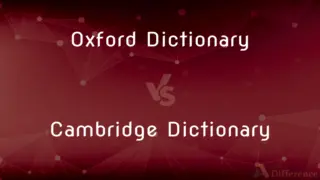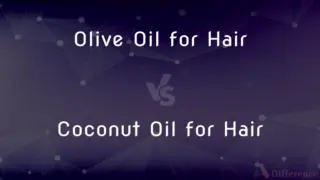Simple Past vs. Present Perfect — What's the Difference?
By Tayyaba Rehman — Published on November 4, 2023
Simple Past describes a specific action that happened in the past, while Present Perfect connects past actions or events to the present, indicating their relevance or continuation.

Difference Between Simple Past and Present Perfect
Table of Contents
ADVERTISEMENT
Key Differences
Understanding verb tenses is foundational to mastering English grammar, and Simple Past and Present Perfect are two crucial tenses.
Simple Past refers to an action that began and ended in the past, often with a specific time reference. For instance, "I visited London in 2019." In contrast, Present Perfect combines the present tense and the past participle to convey actions that happened at an unspecified time in the past but are relevant to or continue into the present, such as "I have visited London."
Using these tenses correctly can greatly impact the meaning and clarity of a sentence.
Simple Past is straightforward, focusing solely on past actions: "She wrote a book." On the other hand, Present Perfect emphasizes the connection between past actions and the present: "She has written several books," suggesting she might write more in the future.
Time expressions are often key indicators of which tense to use.
ADVERTISEMENT
With Simple Past, specific time references are common: "They traveled to Paris last summer." Present Perfect, however, avoids specific time references, as it focuses on the action's present relevance: "They have traveled to several countries."
In essence, while both tenses relate to past actions, their emphasis and usage vary significantly.
Simple Past gives information about a completed action in the past, while Present Perfect highlights the significance, result, or continuation of past actions in the present context.
Comparison Chart
Time Reference
Specific past time
Unspecified time linked to present
Emphasis
Completed action
Action's relevance or continuation to the present
Typical Time Expressions
Yesterday, in 2010, last week
Ever, never, already, yet, recently
Example
She worked there in 2015.
She has worked there.
Continuation in the Present
No continuation implied
May imply continuation or relevance to the present
Compare with Definitions
Simple Past
Details actions or situations that started and ended in the past.
She sang at the concert.
Present Perfect
Describes actions/events in the past with relevance or connection to the present.
She has finished her homework.
Simple Past
Describes past events without connecting them to the present.
They watched the movie last night.
Present Perfect
Indicates past actions/events without a specific completion time but with current relevance.
I have seen that movie before.
Simple Past
Narrates actions without suggesting relevance to the current moment.
I read that book.
Present Perfect
Connects past actions or experiences to the present context.
He has worked here since 2018.
Simple Past
Verb tense expressing actions completed in the past.
He lived in Spain for two years.
Present Perfect
Combines present tense with a past participle to show past actions' present significance.
They have traveled to France multiple times.
Simple Past
Indicates past actions with a defined time frame.
She graduated in 2020.
Present Perfect
Denotes actions/events that occurred at an undefined time but affect the present.
She has always loved reading.
Common Curiosities
Which tense is "She sang beautifully at the concert"?
Simple Past.
Is Simple Past used for specific past events?
Yes, Simple Past typically references actions at a specific past time.
How do I indicate an action from the past that still continues?
Use Present Perfect, like "I have lived here for five years."
Can Simple Past and Present Perfect sometimes be interchangeable?
They can in some contexts, but the meaning or emphasis may change.
Does "I have traveled to Italy" specify when the travel happened?
No, Present Perfect ("have traveled") doesn't specify when, just that it happened.
What does it mean when someone says, "I have eaten sushi before"?
Using Present Perfect, it means the person ate sushi at some point in the past, relevant to a current conversation or context.
Is "already" typically used with Present Perfect?
Yes, "already" often accompanies Present Perfect to indicate an action has happened at an unspecified time before now.
Can Present Perfect be used with specific time references?
No, Present Perfect is used for unspecified times linked to the present.
Which tense would be used to say an action happened yesterday?
Simple Past, because "yesterday" is a specific past time.
Would "I played football as a child" be Simple Past?
Yes, it's Simple Past as it references a specific past period.
Which tense would I use to say I visited Paris in 2015?
Simple Past, as in "I visited Paris in 2015."
Can Present Perfect describe habits?
It can when indicating habits or experiences up to the present, e.g., "I have always liked chocolate."
Is "last week" used with Simple Past or Present Perfect?
"Last week" is used with Simple Past because it's a specific past time.
Can Simple Past describe a general life experience?
Generally, Present Perfect is used for unspecified life experiences, while Simple Past is for specific events or periods.
How do I form Present Perfect tense?
Use the present tense of "have" (have/has) + past participle of the main verb.
Share Your Discovery

Previous Comparison
Oxford Dictionary vs. Cambridge Dictionary
Next Comparison
Olive Oil for Hair vs. Coconut Oil for HairAuthor Spotlight
Written by
Tayyaba RehmanTayyaba Rehman is a distinguished writer, currently serving as a primary contributor to askdifference.com. As a researcher in semantics and etymology, Tayyaba's passion for the complexity of languages and their distinctions has found a perfect home on the platform. Tayyaba delves into the intricacies of language, distinguishing between commonly confused words and phrases, thereby providing clarity for readers worldwide.













































